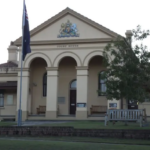Protecting Porter: Federal Government Rejects Inquiry Into ‘Blind Trust’

The Morrison Government has once again protected former Attorney-General Christian Porter against being investigated.
In Federal Parliament earlier this week, the Parliamentary Speaker, Tony Smith, found there was a prima facie case that Mr Porter breached ministerial standards by accepting ‘anonymous’ funds to pay for his personal defamation battle against the ABC.
A prima facie case is one where there is enough evidence to prove in accordance with the law.
The Speaker moved for the matter to be referred to a Parliamentary Committee for inquiry on that basis.
But for the first time since Federation, an Australian government – being the Morrison government, has vetoed that motion and refused to do so.
The government’s unprecedented act follows its previous refusal to launch an investigation into historical sexual assault allegations against Mr Porter.
The backstory
Mr Porter resigned in September 2021 amid controversy over an admission that he had accepted money from a ‘blind trust’ set up to cover the legal fees accrued in his defamation case against the ABC.
Trusts, unlike companies, are not required to be registered in Australia.
Under the terms of a ‘blind trust’, such as the one established with Christian Porter, the trustee is given complete control over the assets within the trust.
Neither the beneficiaries nor the settlor of the trust have any influence over, or knowledge of, the trustees’ decisions about investments, assets or the distribution of trust funds.
Mr Porter resigned despite claiming he acted within parliamentary rules. At the time, he said he had asked the trustee/s to confirm no “lobbyists or prohibited foreign entities” were among the donors, but would go no further in demanding their identities be revealed.
In the eyes of many, Mr Porter “pocketed the money and walked away” without further scrutiny, and legitimate questions have been raised about the source/s of the funds and whether accepting them was within ministerial rules.
In that regard, it should be borne in mind that Mr Porter’s legal battle was personal and nothing to do with his official duties as a Federal MP.
Protecting Porter once again
But earlier this week, the Coalition blocked the bid to initiate an investigation, despite the Speaker of the House finding there was a prima facie case against Mr Porter.
As the Speaker, Tony Smith explained in Parliament, “an opinion by the Speaker that a prima facie case has been made out does not imply a conclusion that a breach of privilege or contempt has occurred. In giving precedence for a motion to be moved, I’m simply allowing the House the opportunity to consider a motion immediately, and debate and decide on whether the matter should be referred to the committee for inquiry and report.”
The motion was defeated 52 to 49.
This is the second time the Morrison Government has denied the Australian public the opportunity for an independent investigation to provide answers in situations that involve Christian Porter.
The first was this year when it steadfastly refused to entertain the idea of an independent investigation into historical rape allegations after NSW Police shut down thier own investigations, despite the fact that at the time, Mr Porter was the chief law officer with an unexplained historical rape allegation attached to his reputaiton.
No transparency or accountability
More recently, the government has sought to pass laws that will keep documentation relating to the National Cabinet, (the group charged with overseeing Australia’s health response to the Covid-19 pandemic) secret.
The Government’s move comes in response to a freedom of information request to access National Cabinet minutes submitted by Senator Rex Patrick earlier this year. In August, The Prime Minister’s office denied the request, stating ‘cabinet in confidence rules’ that apply to the federal cabinet extend to the national body.
Under the section 22A of the Archives Act 1983 (Cth), any federal cabinet documents produced since 1990 remain hidden from the public for a period of 31 years.
However, when the matter was taken to the Administrative Appeals Tribunal, Justice Richard White found that the government’s assertion that the National Cabinet is a subcommittee of the federal cabinet is “tantamount to a submission that any committee may be a ‘committee of the Cabinet’” in terms of freedom of information laws. “This is unsound,” Justice Richard White said.
The reason such documents should be made public, is obviously, that there could be crucial lessons learned from the pandemic, particularly if, as the scientists predict, we could face a wave of public health threats in the coming years.
Too much ‘spin’ and not enough ‘truth’
The Morrison Government though, isn’t really one for transparency, and while it might be a question of ‘public relations management’ and not wanting the negative scrutiny that may come with openness, it’s a critical component of democracy. Without criticism and debate, it’s difficult to spot errors, learn from any mistakes and make real progress.
When moves are made to deliberately hide proceedings around decision-making or withhold information from the public, it erodes trust.
But we must not forget that this too, is a government that has dragged its heels on implementing a Federal Anti-Corruption Body and heavily criticised the role and functions of ICAC which is currently investigating former NSW Premier Gladys Berejiklian.
The privileges committee can start its own investigation, but without a vote of parliament it does not need to report back its findings to the House.
The issue does signal a broader issue about the receipt of donations, but there have been a number of issues raised about spending of taxpayer money at a Federal level too, both of which are good examples of the need for an independent, neutral investigative body which has a broad jurisdiction and the ability to make recommendations to the Commonwealth Director of Public Prosecutions where there is sufficient evidence to support charges of misconduct or breaches of public trust.







